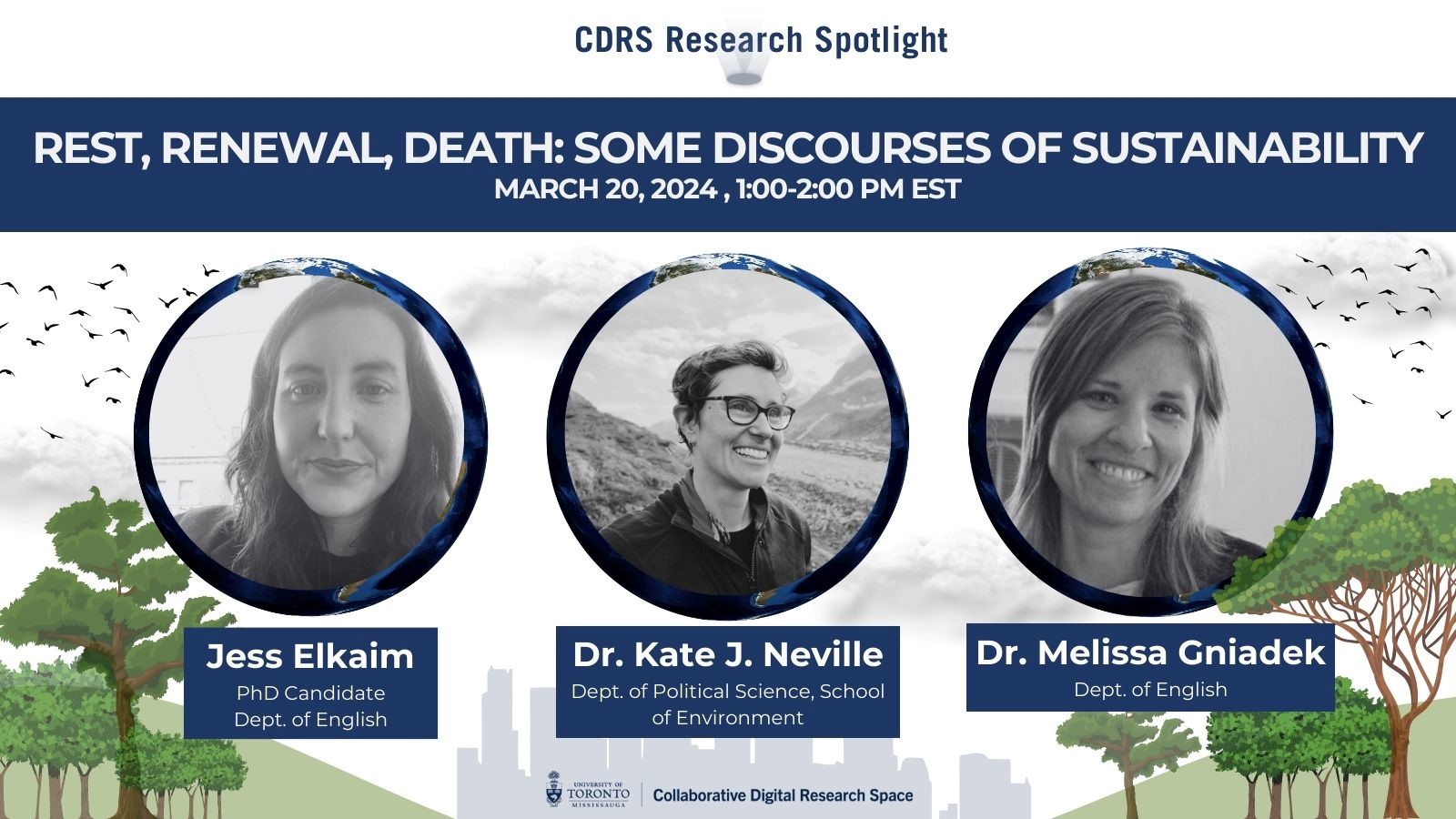CDRS Research Spotlight: Rest, Renewal, Death: Some Discourses of Sustainability
When and Where
Description
This Research Spotlight will bring together scholars working at the intersection of the humanities, social sciences, and ecocriticism to explore some of the different ways they are thinking about “sustainability,” broadly construed.
Kate Neville will present work drawn from her current project, Going to Seed, a collection of essays that explores questions of idleness, considering the labor both of humans and of the myriad other inhabitants of the world. Building on her recent work on the concept of ‘slow justice’ as a way to understand the invisible, less tangible, positive consequences of environmental movements, Going to Seed investigates the possibilities of slowness rather than the acceleration that often defines our responses to urgent environmental change, pressing social injustice, and ever-advancing technologies and global connections. Taking seeds as a starting point, this project asks: what might we learn about work, sustainability, and relationships on this beleaguered planet if we slowed down, stepped back, and held off?
Melissa Gniadek will build on this focus on seeds by talking about trees from her perspective as a scholar of nineteenth-century American literature. Her talk is drawn from a larger project that focuses on the energies of trees and wood products in Herman Melville’s writings in order to think about land and oceans together in the context of environmental and sustainability discourses. Melville has been at the heart of conversations about nineteenth-century energies and petrocultures through readings of his most famous novel, Moby-Dick, and its focus on whaling. This project argues that arborcultures are just as critical. After all, whaling and other forms of global extraction were only possible because of the wood used to build ships. Using examples from Melville’s writing and our ongoing environmental crisis, this brief talk will argue for the need to think about the arboreal and the oceanic worlds together, then and now.
Jess Elkhaim will then discuss what she calls the eco-colonization of the corpse. The North American funeral industry is reporting an increase in demand for “green burials”: eco-friendly methods of dealing with dead bodies to reduce the environmental impact of embalming chemicals, cremation emissions and cemetery spaces. Questioning how we care for human remains in a time of climate crisis is ultimately a conversation about sustainability and futurity. Interestingly, our modern practices of preparing and disposing of the dead emerged in the nineteenth century and were influenced by the environmental consciousness of the time as well as concerns with preservation. These practices not only made death aesthetically pleasing but fueled an affirmative, transcendentalist view of corpses through whom, as Walt Whitman exclaims, one could divine that “there really is no death” and “all goes onward and outward, and nothing collapses.” Embalming technologies preserved the illusion that matter is deathless until the body could be buried in a so-called rural cemetery, a space designed to reflect on death in relation to nature. However, the degradation of Indigenous death by the rural cemetery movement and early American literature deeply problematized this kinship between corpse and earth. Land rights issues and social inequities make caring for the dead, let alone in environmentally consciousness ways, a privilege of the few. Nineteenth-century texts can therefore help us assess the politics of ecological discussions today, and how relationships to the dead body shape our environmental imagination.
Together, this series of 10 minute talks will encourage conversation about sustainability in historical contexts and also connect those contexts to our present and future.
All are welcome to join either in person at the Collaborative Digital Research Space in the Maanjiwe nendamowinan building (MN3233/3235) at the University of Toronto Mississauga, or virtually on Zoom.
Please email us at cdrs.admin@utoronto.ca if you have any questions or accessibility requests.



